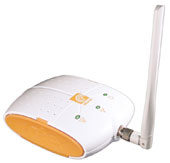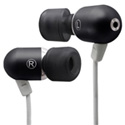Tech Toy of the Month: Wi-Ex zBooster

There are a two different branches of zBoost devices: one for home/office use and one for travel. I’ll mostly talk about the home & office versions of the zBoost, although the in-vehicle model could be very beneficial for some people. The concept of how the zBoost works is pretty simple. An antenna is mounted outside the building (or near a window), which is connected to the zBoost device by a cable. The zBoost device retransmits the signal from the outside to the indoors and vice-versa. This results in a stronger signal inside the building and improved voice calls as well as faster data connections. This sounds fairly easy and it can be, but the mounting of the antenna and running of the cable to a suitable location indoors may be challenging in some situations.
There are a few different home & office versions of the zBoost, but I recommend the $399 YX510-PCS-CEL. It covers the frequencies of all common carriers, except for Nextel/iDEN devices (no zBoost devices covers Nextel/iDEN devices). There are $299 models that cover only a particular frequency range. If you are completely sure that your provider only uses a particular frequency range then you could save $100 and go with the $299 YX500-PCS or YX500-CEL. However, with the extra $100 for the YX510-PCS-CEL you are covered in case you ever change providers or if someone comes to your location that uses a different provider. This is why I recommend that model.
While the zBoost can be a little pricey and the installation may be challenging, for someone who is desperate to improve the strength of a cell signal in their building, it may be well worth the cost and effort.
Visit my other blog, State of the Tech, to keep up with the world of technology.
Q: How often should I clear my web browser’s cache, cookies, history, etc.?
– Submitted by Christy Gan, Lee’s Services
A: It is funny how many misconceptions there are regarding web browser maintenance. To hear some people talk, it would seem that “cookies” are the source of all the world’s computer problems. Probably because clearing all this browser stuff is often a step suggested to people over telephone support. Because it has become part of the lore of do-it-yourself computer maintenance, I often get this question. The answer may completely surprise you.
Honestly, you should never need to clear the web browser’s history, cache, or cookies if you aren’t experiencing any problems with your browser. For example, I use the Safari web browser on my Mac and I do a ton of web browsing. I have my browser set to keep a year’s worth of history because I often want to go back and search my history to find some article I read months ago. I don’t think I’ve ever cleared the cache, cookies, or history of my browser since I’ve had my laptop, which is going on 3 years now. As long as I’m not having any problems, there really is no reason to clear out that stuff.
However, I have seen strange browser problems be resolved by clearing out the browser’s files. Often, this is a necessary troubleshooting step when cleaning out viruses on Windows PCs. And unfortunately, Internet Explorer on Windows is susceptible to a plethora of issues that also require clearing out those files to resolve the issues.
But again, the bottom line is that there really is no good reason to do a periodic cleanup of those browser files. The only time it should be necessary is if you are experiencing a problem with your browser and in those situations, it is often best to have your computer serviced by an qualified technology professional. But in the same breath, it really won’t hurt anything to clear out those files (other than losing your history) if you really feel like it.
If you have a technology question, please let me know and it will be featured in a future newsletter!
Facebook Foibles

Facebook allows for 3 different types of presences. The first is the personal “profile”, which most Facebook users are familiar with. This is where people become your “friends” on Facebook. The second is the business “page”, also known as a fan page because this is where other users can become “fans” of a business. The third is the “group”, which is easy to think of as a sort of online club or meeting place. Facebook users can become “members” of groups. For purposes of this article, I’ll focus on the distinction between profiles and pages.
As my descriptions to this point have alluded, profiles are for personal use and pages are for business use. Unfortunately, it is very easy for new users to Facebook to overlook the fine print describing this and many users create personal profiles for business use. While it may not seem like a big deal, doing so can be problematic. First, profiles are not optimal for use with business. The biggest reason for this is that profiles are not accessible by the general public until you approve them as friends and do not show up in search engine results. Business pages can be found by search engines, can be viewed by anyone without needing your permission, and users can become fans of your page right away. But most importantly, using a personal profile for business use is a violation of Facebook’s terms of service. Facebook can and has terminated personal profile accounts for being used for business purposes.
Now many of you are reading this and thinking to yourself, “oh crap”. Don’t feel bad. I’ve seen many, many businesses make this mistake. Social networking is still a very new phenomenon. Even those who claim to be experts are still learning all the time so don’t think that you are some sort of idiot for creating a “profile” instead of a “page”. It’s an honest mistake and one that Facebook should hold some accountability for because I think they don’t make the distinction clear enough for new users.
So how do you fix this mistake? The first thing to do is stay calm. While Facebook has terminated accounts over this, the reality is that they are not rabidly hunting down violators, especially small businesses with relatively small groups of friends. Second, you need to create a page. The link to create a Facebook page is here: http://www.facebook.com/pages/create.php. Get your page customized with all your pertinent information and logos. Finally, start promoting your new page to the people who are friends of your current profile and get them to turn into fans of your new page. Eventually, you’ll want to deactivate your old profile to avoid confusing people.
Social networking can be a confusing topic, so if you have any further questions, please feel free to contact me. Actually, you might be better off contacting my wife’s company, Queen Bee Consulting, as she is a business coach and has a lot of experience with social networking topics.
January 2010 FYI – Like, Ewwww!

Tech Toy of the Month: Apple iPad

To start, I won’t go over the details of what the iPad can do. For that, simply take a look at Apple’s iPad web site. It has all the information on the features and benefits of the product that somebody could want. What I will do instead is give an overview of what I think the average person needs to know.
There have been tablet computers made before so what makes the iPad different? Most previous tablet computers ran the Windows operating system. These devices never really sold well because most users found them difficult to use. The main reason for this was that the Windows operating system was designed for a keyboard and mouse, not a touch or pen interface. Therefore most users found tablet PCs awkward to use.
The Apple iPad has been designed from the ground up as a touchscreen device and therefore will be much easier to use. Because the interface is based upon the iPhone and iPod Touch, anyone who has used one of these devices will already know exactly how to use the iPad.
At this time, the most important thing to keep in mind is that the iPad is more like an iPhone than a laptop. Primarily, it is an excellent way to browse the web, check e-mail, view photos, read e-books, watch videos, use iTunes, along with some other digital media functions. For many people that is just about everything they want to do with a computer, so they can stop there and be very happy with the iPad. For people who want more, the iPad can also run most iPhone/iPod Touch apps as well as future apps designed specifically for the iPad (such as Apple’s word processor, spreadsheet, and presentation software). This will make it an incredibly functional and powerful computing device. However, the iPad is still not a general-purpose computer as Mac and Windows users are accustomed to. Again, many people won’t care as the iPad will do everything they want it to, but it is important to understand the distinction.
Overall, I think the iPad will change the landscape of the computer marketplace so it will be a good idea to become familiar with the device and understand how it can be used in both home and business. If you’d like to know more about the iPad or any other technology topic, feel free to contact me.
Q: What is a Multi-Core Processor?
– Submitted by Tony Cecena, Cecena’s Jewelry
A: It used to be relatively simple to compare computer processors. One could look at the clock speed of a processor (Mhz or Ghz) and that would be a good indicator of the relative performance of that processor. Of course, this wasn’t a perfect method, but it was a good way to approximate. Within the last few years, however, processor manufacturers have stopped focusing on clock speed and have started introducing and marketing other technologies in processors. One of the more commonly touted technologies are processors with multiple cores. Unfortunately, most people have no idea what a multiple-core processor is. So let me enlighten you.
First a little background. Many years ago, computer manufacturers developed technology to allow computers to have multiple processors. A computer with more than one processor could be more powerful. For some applications, multiple processor computers showed significant performance improvements. Unfortunately, multiple processor computers were generally a lot more expensive and required specialized motherboards and software that was specifically written to take advantage of extra processors.
Fast forward a few years and processor manufacturers develop technology that allow a processor to have multiple “cores”, which in very simple terms is a single processor that behaves in many ways as if it is multiple processors. For many reasons multiple core processors are a great improvement over single-core processors and multiple processors. However, all the average person needs to know is that most processors made today have multiple cores and the specifics are not all that important. The only important fact to determine is relative performance. Competent sales people and technology professionals should be able to explain the relative performance of various processors when asked. If not, perhaps you should move on.
One thing to keep in mind is that just because a processor has multiple cores does not mean it is a factor of that multiple faster than a single core processor. For example, a dual-core processor is not necessarily twice as fast as a single-core processor, nor is a quad-core processor four times as fast. One reason is that software needs to be written so as to be optimized for multiple-core processors to take full advantage of them. Most software developers will not do this as it requires a lot more work. However, it should become easier in the future as software development tools will allow programmers to automatically take advantage of multiple-core technologies. One example of this is Apple’s Mac OS X 10.6 operating system, known as Snow Leopard. Snow Leopard has programming technology in it that allows software developers to automatically take full advantage of the processor technology in the computer without needing to specifically optimize their software to that processor. So no matter if the computer’s processor is single, dual, or quad core, their software will be able to run at full performance on all of them.
If you have a technology question, please let me know and it will be featured in a future newsletter!
You’ve Just Lost All Your Data … Now What?

Many users put off purchasing a backup system because they think they are too expensive. Too many users do not realize just how valuable their data is until they lose it. Business data, financial information, irreplaceable pictures, school work … I’ve seen way too many users suffer needlessly when a simple backup system would have saved their data. The good news is that simple backup systems for home users can be less than $200 and good backup systems suitable for businesses can be $400 or less. Compared to the devastation from losing data, or the price of a data recovery specialist, the cost of a backup system is negligible.
If your New Year’s resolution didn’t include protecting your data, it is not too late. Contact me today, let’s talk about what kind of data you need protecting, and I can recommend a backup solution that keep your data safe without breaking the bank.
December 2009 FYI – They’ve Gone Too Far With The Whole “Multifunction Printer” Thing …

Holiday Tech Toys 2009!

Ghosts of Christmas Past – I’ve written 2 previous Holiday Tech Toys lists (2007 and 2008) and you should go back and review them as many of the items there are still great gifts this year. Also, clicking this link will take you to all my previous Tech Toy of the Month articles so you can review other tech gift ideas.





Q: What kind of lifespan should a laptop battery have and where should I get a replacement battery?
A: Just to be clear, this question isn’t asking how long a laptop battery should hold a charge, but rather how long a battery should be useful. This is an extremely common question anymore. It seems people are holding on to their laptops longer and longer, which is not surprising given that most computers produced over the last 5 years or so are powerful enough for most common tasks. This is true for desktops as well, but since laptops are mobile devices they need batteries to function, which makes keeping a laptop a little more challenging.
Most laptop batteries will have a lifespan of about 2 – 3 years (the exception being the latest Apple MacBook/MacBook Pro batteries which claim a lifespan of about 5 years). However, the lifespan of a battery can be greatly affected by the way the owner of the laptop uses their batteries. Abusive use of a laptop battery can be detrimental of course, and I covered that in a previous article. But heavy laptop users may simply “use up” the charge cycles of a battery much more quickly than average users. Users who use their laptops on battery for many hours a day may only get 1 – 2 years of use before the battery loses a significant proportion of their ability to hold a charge. Users who don’t use their laptops all that often or who leave them plugged in a significant amount of time may get 3-4 years of useful life from the battery.
Sometimes, a battery may be defective and lose charge capacity too quickly. Unfortunately most manufactures don’t warrant their batteries past 1 year, even with extended warranties. Check the policies of a laptop manufacturer BEFORE making the purchase if this is important to you.
Finally, if you do need a new battery, I don’t suggest shopping for third party batteries. You may be able to save some money from a third-party battery manufacturer, but in my experience, the odds of problems and the hassle of service isn’t worth it. Most brand-name batteries are in the $100 to $140 range. For that you get the peace of mind knowing that the battery is the exact right model for your laptop and that if there is a problem you should be able to get service very easily.
If you have any questions about any technology topic, call or contact The Tech Spot today!
